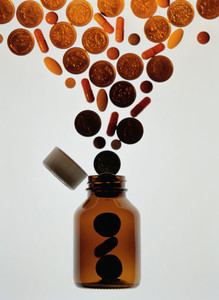The US has experienced a policy debate as to whether competition from biosimilars is the best strategy for achieving price reductions for biologicals or, rather, whether direct price regulation after loss of patent exclusivity would be more effective. In order to investigate this issue, authors from the US and France combined quantitative and case study methods to examine in detail the interaction between market and administrative mechanisms to reduce biologicals’ prices in France. In their article they present comprehensive data on market shares and prices for three major biologicals and their 11 competing biosimilars between 2004 and 2020 [1].
Competition from biosimilars drives price reductions for biologicals in France
Biosimilars/Research
|
Posted 15/10/2021
 0
Post your comment
0
Post your comment

France has a single-payer health insurance system with authority to impose pharmaceutical price reductions but relies on decentralized market negotiations between hospitals and manufacturers to establish prices for injected and infused biologicals. The national health insurance system negotiates a national tariff for each product, but these are the prices paid by the government to hospitals where the drugs are administered, not to the drug manufacturers themselves. Hospitals and hospital purchasing groups negotiate prices with manufacturers who typically offer significant discounts to be included in the hospital’s inventories and formularies. In these negotiations the hospitals rely on biosimilars to stimulate competition. The hospitals have an incentive to negotiate prices as low as possible, since they are allowed to retain half the difference between the national price and the price they negotiate.
The national insurer relies on this decentralized process of negotiations and the ‘shared savings’ incentives for hospitals to obtain discounts from manufacturers, rather than unilaterally imposing reductions on manufacturers. Each year, the price reductions negotiated by hospitals are adopted by the health insurance system for its national tariffs. This eliminates the shared savings potential for hospitals at the prices they had negotiated with manufacturers, driving hospitals to negotiate a new round of discounts. The French system exhibits an iterative process of biosimilar market launch, price reductions, reductions for the reference biologicals, reductions in the national tariffs, then new launches and further share increases for biosimilars and further price reductions.
In their article Robinson and Jarrion measure 2004–2020 trends in prices, price reductions, utilization and market shares for Remicade (infliximab), Enbrel (etanercept), Humira (adalimumab) and their 11 competing biosimilars. Biosimilar launches are associated with a sequence of price reductions for the originator biological, for other biologicals that treat similar conditions and for all related biosimilars.
The authors conclude that the French experience provides lessons for the US and other nations in their efforts to use competition from biosimilars to drive price reductions and savings from biologicals. Reliance on biosimilars can be effective in reducing the prices of biologicals. Most importantly, health programmes can combine centralized administrative and decentralized market mechanisms in the pursuit of social goals.
Conflict of interest
The author of the research paper [1] did not provide any conflict of interest statement.
Abstracted by Professor James C Robinson, PhD, Leonard D Schaeffer Professor of Health Economics, Director of Berkeley Center for Health Technology, Division Head of Health Policy and Management, School of Public Health, University of California Berkeley, California, USA.
Editor’s comment
Readers interested to learn more about biosimilars in Europe are invited to visit www.gabi-journal.net to view the following manuscript published in GaBI Journal:
Use of biosimilars in Europe differs across countries
GaBI Journal is indexed in Embase, Scopus, Emerging Sources Citation Index and more.
Readers interested in contributing a research or perspective paper to GaBI Journal – an independent, peer reviewed academic journal – please send us your submission here.
GaBI Journal Citation Impact
1.9 – CiteScore 2020 (calculated on 5 May 2021)
2.0 – CiteScoreTracker 2021 (Last updated on 5 October 2021)
Submit a manuscript to GaBI Journal
Related articles
France to allow biosimilars substitution
France aims to reach 80% biosimilar penetration by 2022
| LATIN AMERICAN FORUM The new section of the ‘Latin American Forum’ on GaBI has been launched. The objective of this new section is to provide you with all the latest news and updates on developments of generic and biosimilar medicines in Latin America in Spanish. View this week’s headline article: Posible colaboración biotecnológica entre India y Colombia Browse the news in the Latin American Forum! Register to receive the GaBI Latin American Forum newsletter. Inform colleagues and friends of this new initiative. LATIN AMERICAN FORUM Se ha lanzado la nueva sección del ‘Foro Latinoamericano’ sobre GaBI. El objetivo de esta nueva sección es brindarle las últimas noticias y actualizaciones sobre desarrollos de medicamentos genéricos y biosimilares en América Latina en español. Vea el artículo principal de esta semana: Posible colaboración biotecnológica entre India y Colombia Explore las noticias en el Foro Latinoamericano! Regístrese para recibir el boletín informativo GaBI Foro Latinoamericano. Informe a colegas y amigos sobre esta nueva iniciativa. |
Reference
1. Robinson JC, Jarrion Q. Competition from biosimilars drives price reductions for biologics in the French Single-Payer Health System. Health Aff (Millwood). 2021;40(8):1190-7.
Permission granted to reproduce for personal and non-commercial use only. All other reproduction, copy or reprinting of all or part of any ‘Content’ found on this website is strictly prohibited without the prior consent of the publisher. Contact the publisher to obtain permission before redistributing.
Copyright – Unless otherwise stated all contents of this website are © 2021 Pro Pharma Communications International. All Rights Reserved.
News
FDA approves Poherdy (first interchangeable pertuzumab) and Armlupeg (pegfilgrastim) biosimilars
EMA recommends approval for insulin glargine biosimilar Ondibta and denosumab biosimilar Osqay
General
Samsung Bioepis wins Pyzchiva case; Regeneron patent rulings threaten foreign biosimilars
Chinese biosimilars go global: growth, partnerships, and challenges
What is the future for the US biosimilar interchangeability designation

Biosimilars/Research Posted 05/06/2025
Biosimilar clinical efficacy studies: are they still necessary?

Biosimilars/Research Posted 27/05/2025
The best selling biotechnology drugs of 2008: the next biosimilars targets








Post your comment